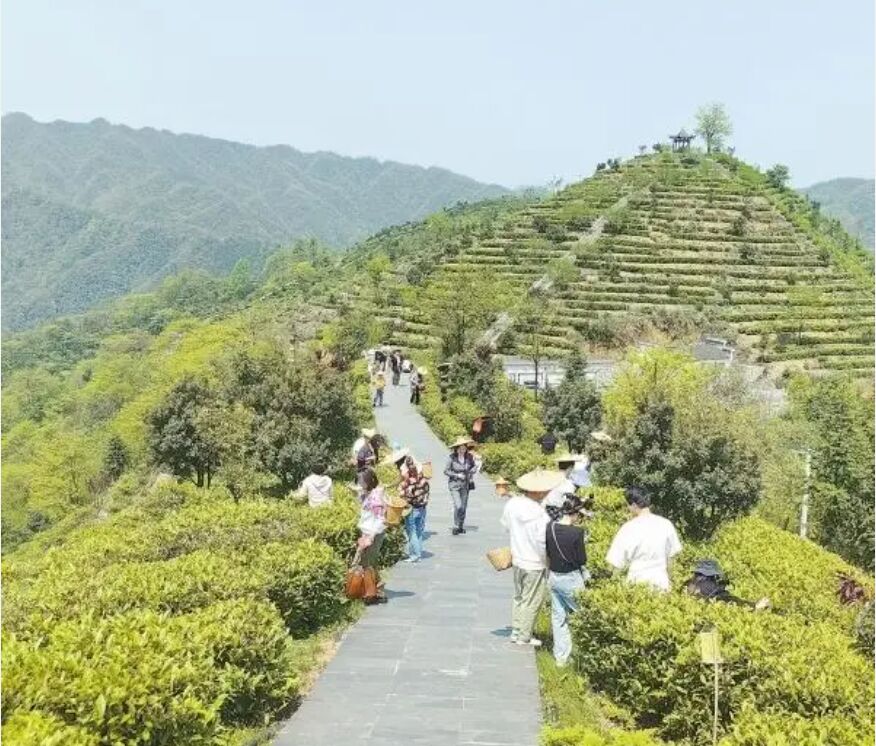Industrial tourism thrives in Changde
2024-07-02

Two automated production lines operate at full load in the refined rice production workshop of GAEA GEM. Here, it needs 19 processes for unhusked rice to turn into refined rice.
GAEA GEM is the first listed company in the domestic grain system. In 2010, it was approved as a demonstration site for industrial tourism in Hunan Province.
In its agricultural culture exhibition area, models of the ancient rice field site dating back 6,500 years from Chengtoushan in Lixian County and various traditional Chinese rice farming tools are displayed, allowing tourists to experience the brilliant rice farming civilization in the Liyang Plain and understand the story of “a Grain of Rice” in Changde.
Cows quietly produced milk on intelligent milking machines in a queue in the milking hall of Deren Husbandry in the Xihu Management District.
This is a standardized modern dairy farm built by Deren Husbandry. 1,800 cows from New Zealand produce 15 tons of milk per day. The fresh milk squeezed out is directly fed into a direct cooling milk tank through a pipeline. After rapid cooling, milk is sent to a dairy processing plant which is a 12-minute drive away from the farm. The processed and packaged fresh milk is delivered to various stores in the morning of the next day.
Each cow wears an “intelligent collar” around its neck and a “pedometer” around its leg in the farm. They listen to music, take a shower, sleep on “beds” filled with bran and fine sand every day, and have a “single room”.
“Mood, diet, and exercise affect cows’ milk production. The amount of food they eat and the steps they take every day are accurately monitored,” said Zhang Yao, head of industrial tourism department at Deren Husbandry.
Besides, there are complete supporting facilities in the scenic area, such as Cow Academy, Science and Technology Innovation Husbandry Inn, Alfalfa Restaurant, and Children’s Playground.
“After knowing how ‘grass’ turns into ‘a cup of milk’, I will trust in the brand even more. And children can learn a lot of knowledge not available in textbooks by watching how cows produce milk, milking by themselves, and making yogurt,” said a tourist.
The Wuyunjie National Nature Reserve in the south of Taoyuan County has a forest coverage rate of up to 92.5%, and there are patches of wild tea trees.
Taoyuan black tea has a history of more than 2,000 years, and Taoyuan County has been known as the “hometown of tea” since ancient times. During the Ming and Qing dynasties, Taoyuan black tea was sold abroad.
In 2015, Zhan Wei, founder of Junhe Wild Tea Development Co., Ltd. in Taoyuan County, returned to his hometown Caijiatang Village of Taoyuan County from Shanghai. He established a professional cooperative for wild tea to help villagers increase income. Then he began to develop the industrial tourism after knowing its market potential.
In May this year, Junhe Wild Tea welcomed multiple groups of young tourists. They picked tea leaves with bamboo baskets in the original ecological tea garden, and witnessed the exquisite production process of black tea, including picking, sunshine withering, rolling, fermenting, and drying. They immersed themselves in authentic tea culture.
Zhan Wei said that industrial tourism provides tourists with more travel options and allows them to have an immersive travel experience.
The company has grown from a tea production enterprise to a provincial-level leading enterprise in agricultural industrialization, integrating tea cultivation, tea processing, poverty alleviation through industries, tourism development, and tea culture promotion. In 2023, its tea garden received 50,000 visitors.
At present, there are 393 tea enterprises in Changde. Many enterprises integrate tea and tourism to meet the consumption needs of different groups of tourists.
The old factory buildings of the 1980s are arranged in a row in the factory area of Deshan Liquor-making Industry in the Changde Economic and Technological Development Zone. Here, tourists are enchanted by the traditional architectural aesthetics and the profound Deshan liquor culture.
The company, established in 1952, is also the first state-owned distillery in Hunan after the founding of the People’s Republic of China. More than 1,000 old cellars from the 1980s in the factory are well preserved, and 4,800 large pottery jars on the 6-story underground wine cellar are eye-catching.
In February this year, “Deshan” was rated as a “Chinese time-honored brand”. The company has launched five immersive industrial tourism experience routes, including the “Time Corridor”, brewing workshop, underground wine cellar, filling workshop, and blending experience center.
Tourists can appreciate the ancient brewing techniques, mix fine wine with the intangible cultural heritage inheritors of the ancient brewing techniques of Deshan liquor, and taste specialty dishes such as lees fish and drunken shrimp.
“Industrial tourism can help brand publicity, enable tourists to experience the ancient production process of liquor, and promote sales. The company is making every effort to present tourists with an immersive perception of modern changes in intangible cultural heritage, allow them to deeply experience the Deshan liquor culture and promote the integration of culture, industry and tourism,” said Zeng Tiejun, general manager of the company.
As of now, 14 enterprises in Changde have been rated as Hunan provincial-level industrial tourism demonstration sites. From January to May this year, these sites received over 120,000 tourists, with a tourism revenue of over 8 million yuan.
Zhu Cunzhao, deputy director of the Changde Bureau of Culture, Tourism, Television, Radio, and Sports, said that Changde will continue efforts to promote the integrated development of industry and tourism, advance the deep development of industrial tourism products, strengthen the construction of tourism talent teams, and improve tourism public service facilities to enhance the attractiveness of the industrial tourism brand in Changde.


